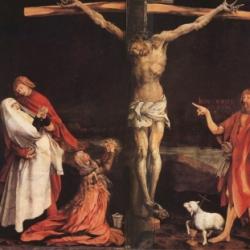One of the main bones of contention between the Lutheran and Reformed Churches has been the doctrine of the omnipresence of the human nature of Christ. This doctrine is not isolated for Lutherans and is not merely promoted to support our view of the Lord’s Supper as is often claimed. We come to this position because of an overall conception of the incarnation itself which differs from that of the Reformed.
When Christ became incarnate, the human and divine natures were united in one person. These natures were not mixed into one, nor were they completely separated from one another. They interpenetrated one another.
Because of this union of the two natures, the Lutherans talked about a communicatio idiomatum, meaning communicating, or sharing, of attributes. This doctrine states that, due to the unity of the person, the attributes of the divine nature can be attributed to the human nature. For the sake of organization, Lutherans have typically put the communication of attributes into three classes, orgenera, though sometimes four.
The first class is the genus idiomaticum. This means that what is attributed to one nature can be attributed to the whole person. Thus one can say “the Son of God died” without having to clarify by saying, “the human nature of Christ died.”
The second class is the genus maiestaticum. This is where the real controversy arises. According to this doctrine, the attributes of Christ’s divine nature are communicated to his human nature. They are not attributed to the human nature through necessity or nature, but by the free attribution of the divine nature. So what are some of these attributes?
1. The majesty of divinity. Any time scripture talks about majesty, power or authority being given to Christ in time it must be talking about His human nature. If one does not confess this, he is admitting that Christ indeed did not have full power and majesty according to His divine nature before this point.
Some examples in scripture are:
“Then Jesus came to them and said, ‘All authority in heaven and on earth has been given to me.'” (Matthew 28:18)
“All things have been committed to me by my Father.” (Luke 10:22)
“So he became as much superior to the angels as the name he has inherited is superior to theirs.” (Hebrews 1:4)
“You made him a little[a] lower than the angels;
you crowned him with glory and honor
and put everything under his feet.”
In putting everything under him, God left nothing that is not subject to him. Yet at present we do not see everything subject to him.” (Hebrews 2:7-8)
“And God placed all things under his feet and appointed him to be head over everything for the church” (Ephesians 1:22)
“For he “has put everything under his feet.”[a] Now when it says that “everything” has been put under him, it is clear that this does not include God himself, who put everything under Christ.” (1 Corinthians 15:27)
2. Omniscience There are several times in the New Testament where divine knowledge is attributed to the human nature of Christ.
“He did not need man’s testimony about man, for he knew what was in a man.” (John 2:25)
3. Omnipresence Here is where the controversy usually arises. Lutherans claim that Christ is omnipresent as a person, thus both natures are omnipresent. The Reformed have historically argues that Jesus is at the right hand of the Father according to His human nature, and omnipresent only according to His divine nature.
Does the Scripture teach the omnipresence of Christ’s human nature? The most clear verse on this subject is Ephesians 4:7-10:
“But to each one of us grace has been given as Christ apportioned it. This is why it says:
“When he ascended on high,
he led captives in his train
and gave gifts to men.” (What does “he ascended” mean except that he also descended to the lower, earthly regions? He who descended is the very one who ascended higher than all the heavens, in order to fill the whole universe.)”
The text seems clear. Christ descended, ascended, and now fills the whole universe. This cannot be according to His divine nature because it describes a point in time wherein He began to fill all things. His divine nature always filled all things. Ephesians 1:23 also states that He “fills everything in every way.” These verses have been interpreted by the Reformed to mean either one of 2 things.
1. The “filling all things” refers to his accomplishment of redemption, or his fulfillment of prophecy. However, the context has nothing whatsoever to do with salvation or Christ’s work on the cross. It has to do with cosmology. It describes a place He was from, went, and now is.
2. This refers to his sustaining and ruling the whole universe. This simply is not in the text. Filling the whole universe simply means filling the whole universe. There is not any way around it except to explain away the clear meaning.
Christ’s promise in Matthew 28 is that He will always be with His church. The man Jesus standing in front of His disciples said this. Was there any reason for them to think He only meant according to His divine nature? No, of course not. The one speaking was the God-man.
Christ shows that He has power over normal spacial constraints according to His human nature. In John 20:9 Jesus walks through a locked door. Even before the resurrection He vanished from sight. (John 8:59, Luke 4:30)
Is it really taking scripture seriously to say that the “fullness of deity” (Colossians 2:9) dwelt in bodily form if indeed the deity of Christ is mostly separate from the human nature? If the incarnation really means that the second person of the trinity is both God and man, we must say more than that He is only man in one specific location.
To be Biblically consistent and to affirm that the fullness of Christ’s deity was and is incarnate, one must confess to communication of omnipresence.
The third class of communication is the genus apotelesmaticum. This doctrine states that all of the functions that Christ performs as prophet, priest, and king are performed by both natures. The entire person accomplishes every part of redemption, not simply one nature.











